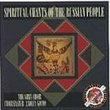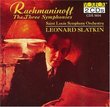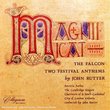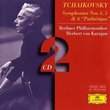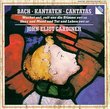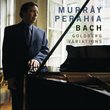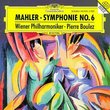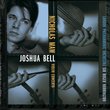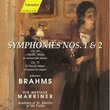| All Artists: Shostakovich, Concertgebouw Orchestra, Bernard Haitink Title: Symphony 8 Members Wishing: 0 Total Copies: 0 Label: Decca Import Release Date: 8/8/2000 Album Type: Original recording reissued, Import Genre: Classical Styles: Historical Periods, Modern, 20th, & 21st Century, Symphonies Number of Discs: 1 SwapaCD Credits: 1 UPC: 028942507128 |
Search - Shostakovich, Concertgebouw Orchestra, Bernard Haitink :: Symphony 8
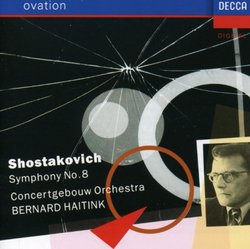 | Shostakovich, Concertgebouw Orchestra, Bernard Haitink Symphony 8 Genre: Classical
|
Larger Image |
CD DetailsSimilar CDs
Similarly Requested CDs
|
CD ReviewsPowerful performance of the symphonic Guernica R. Hutchinson | a world ruled by fossil fuels and fossil minds | 10/16/2003 (4 out of 5 stars) "Shostakovich's 8th Symphony is one of his greatest, along with the 4th, 5th and 10th. Written during WWII, it is sometimes referred to as "The Stalingrad," though with less cause than the 7th being known as "The Leningrad" -- Shostakovich was indeed in Leningrad when the German siege began, and composed the first three movements of the 7th before being evacuated. The 8th Symphony is a powerful expression of the horror of war, which has been compared to Picasso's painting "Guernica." First performed on November 4, 1943 with Mravinsky conducting, it was largely ignored at first. Eventually in 1948 the Soviet authorities denounced Shostakovich for producing such a pessimistic work, failing to celebrate the great victory. This is not a work of propaganda, but rather a profound tragedy, the only appropriate response to such massive brutality, suffering and death. While similar in some respects to the 5th -- for instance the 3-note opening theme echoes its 4-note opening -- the 8th is larger and more complex, expressing much of what Shostakovich had been holding back due to Stalin's threats. This is not speculation -- Shostakovich himself said that the war made it possible for artists to more freely express themselves. It was not only the victims of Hitler's aggression but the victims of Stalin's terror prior to the war that the 8th commemmorates. The 8th has an unusual construction, opening with a 26-minute adagio, followed by two fast movements of six minutes each, then a nine-minute largo and finally a 15-minute allegretto. The dramatic center is the allegro non troppo, which is a battle scene, punctuated by a crazed trumpet, symbolizing to me the insanity of war. In the several versions of the 8th that I've heard, the central movement, which is horrifying and vivid, burning itself into your brain, is what makes or breaks a performance. The first movement builds up to it, and the last two movements decompress from it -- if it fails, the entire symphony fails. Haitink and his Concertgebouw in this 1982 performance storm the battle scene with manic intensity. It is far more effective than the mushy performance of Rostropovich and the National's 1991 recording on Teldec (see my review). The recording which to me represents perfection is also on Decca, a 1989 performance by Georg Solti and the Chicago Symphony Orchestra (#425 675-2). Solti drives the CSO with relentless intensity throughout the entire work, and the allegro non troppo is not quite as manic as Haitink's, striking the perfect balance of precision and intensity. The Rostropovich recording is superior to the Haitink in the last two movements, coming closer to Solti in attaining a smooth, compelling narrative flow. This Haitink version is more static and cold in the largo and allegretto, failing to fully capture the poignance and tragedy of the war's aftermath. Shostakovich's 8th Symphony is one of the towering masterworks of 20th century music, and 20th century art overall. I listened to the Solti recording especially over and over from August of 2002 through the U.S. war on Iraq in April 2003." Haitink's best Shostakovich recording! richard e yaklich | Miami, FL | 07/26/2001 (5 out of 5 stars) "This recording of the Shostakovich Symphony No. 8 with the Concertgebouw Orchestra is one of the best perfromances on CD. Hats off too the London/Decca recording team for capturing a marvelous performance that leaves one feeling like they are in the middle of the concert hall. The real stars of this recording though are Hatink and his superb Concertgebouw Orchestra. Hatink's interpertation of this monumental score brings to light all the horors of WWII as composed by Shostakovich in this "Great Patriotic War" symphony. The gradual tempo increase from 'Adagio' to 'Allergro' in the first movement is perfromed with dynamic persision. Listen to the burtal playing of the Concertgebouw in the third movement as this diabloic scherzo marches head on into the grandious climax of the 'Largo'. Hatink's conducting of the final movement is nothing but remarkable as he relaxes the tension heard in the preceeding movements, and brings this work to a surealistic close. Wonderful recording!" One of the best of Haitink's Shostakovich cycle Bruce Hodges | New York, NY | 11/06/2002 (5 out of 5 stars) "Shostakovich's Eighth Symphony is a vast and bleak landscape - quiet much of the time but with stretches of enormous power (and volume). This dark piece requires a huge orchestra to summon up its canvas of sorrow and grief. Needless to say, this is not music for casual listening.In the 1980's, Bernard Haitink completed a cycle of all fifteen of these extraordinary symphonies, and this recording is one of the best in the series. His straightforward, no-nonsense interpretation is a nice contrast to the overwhelming emotional content of the piece - a very different type of approach from say, Bernstein or Gergiev.Haitink's clear vision is helped by superb playing from the Concertgebouw Orchestra, sounding totally comfortable with the demanding score. The recording quality is outstanding, also one of the best in the series. In short, for most people this will not a piece for everyday listening, but when the mood is right, this is an intense, altogether moving experience."
|

 Track Listings (5) - Disc #1
Track Listings (5) - Disc #1
